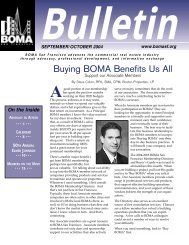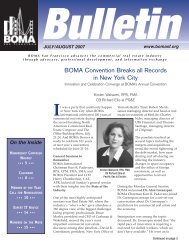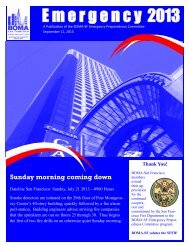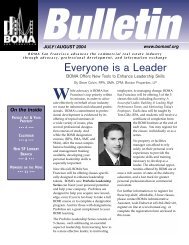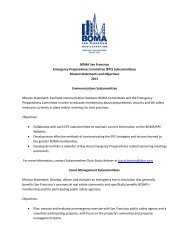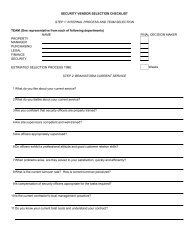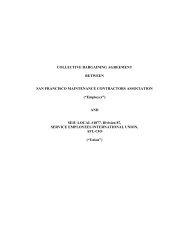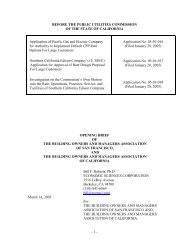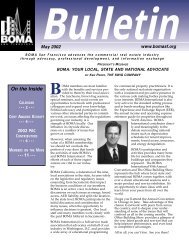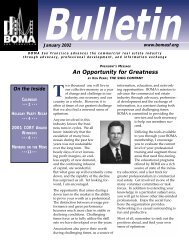Superstorm Sandy Lessons Learned - BOMA SF
Superstorm Sandy Lessons Learned - BOMA SF
Superstorm Sandy Lessons Learned - BOMA SF
Create successful ePaper yourself
Turn your PDF publications into a flip-book with our unique Google optimized e-Paper software.
Management should consider having pre-existing contracts with vendors, to ensure timely deliveries and<br />
service and reasonable costs and terms. A reasonable planning figure for pre-placement of equipment is a fivehour<br />
response time into the city.<br />
<strong>BOMA</strong>/NY, as part of its incident operations, should work with NYPD and OEM to identify the most accessible<br />
traffic routes into and out of the city. These routes should be included in the <strong>BOMA</strong>/NY Alerts.<br />
Management should ask vendors about their disaster plans, to include alternate office locations, alternate<br />
means of communications and plans for alternate suppliers.<br />
<strong>BOMA</strong>/NY should encourage a public and private initiative to explore available barrier-type systems that<br />
commercial buildings and other facilities can use to mitigate flooding. While <strong>BOMA</strong>/NY can not endorse any<br />
single product, it can provide members possible options for useful water barriers.<br />
Code Issues<br />
In general, two types of code issues arose as a result of Hurricane <strong>Sandy</strong>. The first involved temporary waivers of<br />
codes. These types of waivers ranged from pumping water to operating generators. <strong>BOMA</strong>/NY’s challenge was to<br />
ensure its members were aware of the various waivers granted for recovery operations. The second type of code<br />
issues were much more deep-rooted and involved long standing building codes, many of which were designed for<br />
building safety, and mandated requirements such as fuel storage locations.<br />
Recommendations<br />
<strong>BOMA</strong>/NY should develop an incident management team comprised of functional area specialists who are<br />
able to provide rapid liaison with city agencies to identify changing code requirements and/or waivers during an<br />
incident. Current code issues and waivers should be included as a section in each <strong>BOMA</strong>/NY Alert.<br />
<strong>BOMA</strong>/NY should work with city officials to make reasonable and prudent changes to existing building codes<br />
and regulations.<br />
Insurance<br />
Most of the insurance issues are only now coming to light. When the survey was sent out and completed, insurance<br />
claims were in the very early stages and many issues were not known at that time.<br />
A vast majority of survey respondents, 62%, did not coordinate with their insurance carriers before the hurricane.<br />
After the hurricane, 56% of respondents contacted their insurance company. Of owner/manager respondents, 40%<br />
eventually filed a claim with their carriers.<br />
At the time the survey was taken, 11% had signed a Statement of Loss and 47% had not signed a Statement of Loss.<br />
This data might have been premature as the 60-day period for signing and returning the Statement of Loss had not<br />
been reached by the time most people filled out the survey.<br />
Recommendations<br />
Insurance issues covering general business liability, environmental insurance, pollution insurance, etc. should<br />
be on file and updated with management.<br />
Management should understand that the insurance industry is changing and policies may not be fully<br />
understood by their organizations. It is critical to know what is covered in policies and areas of limited coverage.<br />
Contracts signed by management assume that insurance claims monies will cover the entire cost of loss, or<br />
at least most of it. Most of these types of contracts contain wording which states that no matter how much the<br />
insurance company pays the insured, the management company/owner is responsible for the full cost of the<br />
invoice and is expected to pay in a timely manner.<br />
When purchasing insurance policies, management should have someone that fully understands what the<br />
policies cover and what limits are being placed on the insured.<br />
Management should make sure the following is up to date; building maintenance documentation, all DOB<br />
permits, any actions requested by the insurance company, any outstanding issues with FDNY and any other<br />
agency requirements. All of these areas may be reasons for claims denial.<br />
While management of insurance and insurance claims may be handled at the corporate level, building<br />
managers must have a basic knowledge of and types of issues that may arise during the insurance claims<br />
process.<br />
Some managers suggested having a public adjuster on call or an insurance coverage attorney on retainer.<br />
These specialists can help with the claims and reimbursement processes. As always, check references and<br />
credentials before hiring a specialist.<br />
9 <strong>BOMA</strong>/NY HURRICANE SANDY LESSONS LEARNED REPORT | JANUARY 2013



